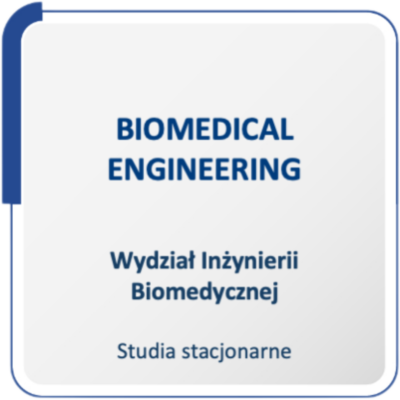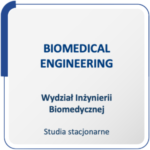- Opis
- Dodatkowe informacje
Opis
Biomedical engineering
| Mode of study | Title obtained | Period of study | Language of instruction | Place of classes | Minimum number of credits (Polish students) | Admission limit | Points to guarantee admission |
|---|---|---|---|---|---|---|---|
| Full-time | Bachelor of Science (Inżynier) |
3,5 years / 7 semesters |
English | Zabrze | 45 out of 150 max. | 60 | 60 |
Faculty of Biomedical Engineering
Zabrze, 40 Roosevelta St.
phone: 32 277 74 30
e-mail: wib_rekrutacja@polsl.pl
Biomedical engineering combines knowledge of technical, medical, and biological sciences. Therefore, biomedical engineers generally focus on designing devices to help doctors diagnose, treat, and prevent diseases. We will teach you issues linking technology and medicine, including computer science and medical electronics, telematics, medical materials, biomechanics, modeling of biological structures and physiological processes, and medical imaging techniques. Your skills will let you support medicine with advanced technologies.
Biomedical engineering is an intensively developing science, especially in countries with high technological advancement. Education in this field responds to the market requirements regarding specialized engineering staff. One of the main reasons is the dynamic development of companies dealing in producing products and materials for the needs of medicine and, consequently, implementing innovative technologies and medical devices in healthcare units. Specialized therapy is one of the intelligent specialties of the Silesian Region, Poland, so the regional labor market will look for high-class specialists. Classes in our field of study are conducted by well-qualified research and teaching staff in modern laboratories equipped with new-generation equipment. This guarantees a high level of education, confirmed by the prestigious Certificate of Educational Excellence award from the Polish Accreditation Committee in the Excellent Field of Study category.
After graduation, you will be able to formulate and solve biomedical problems using knowledge in information and communication technologies, artificial intelligence, biomechanics, medical equipment, implants and artificial organs, information processing and transmission. You will learn to work creatively in a technical environment, make decisions, and cooperate with people from the biomedical community in training, operation, service, and maintenance of medical devices. As a graduate, you will be familiar with the process of diagnostic and therapeutic systems in biomechanical research and medical imaging techniques. You will acquire skills that will allow you to design and manufacture medical devices.
In our didactic process, we constantly involve companies where students can carry out internships and apprenticeships, which increases their competencies corresponding to the needs of the modern economy. Our students receive employment offers already during the internship. The Faculty of Biomedical Engineering has signed many agreements with companies operating in the medical market and in the field of biomedical engineering, which also cover the support of the education process. A common practice is to involve students in research conducted jointly with companies as part of engineering and master’s theses. This allows putting theoretical knowledge into practice.
Biomedical engineering graduates are prepared for creative work in an environment where technical sciences support medicine. They can work as administrators of medical information systems, biomechatronics engineers, biomechanical engineers in rehabilitation and sports, CAD design engineers, engineers for certification of medical devices, engineers for materials for medicine or measurement systems, researchers in universities and research institutes, programmers, designers of intelligent devices or artificial intelligence systems, medical equipment servicemen, or data mining specialists. Graduates are also prepared to run their own businesses, also in the form of start-ups.
“I am a programmer, a software engineer. Choosing this specialty (Medical Informatics and Equipment) gave me a fantastic job, which is also my passion.”
“Choosing this specialty (Medical Informatics and Equipment) allowed me to take a broader look at the surrounding world and the opportunities offered by technology.”
“I work at the RESEARCH AND DEVELOPMENT CENTER OF THE POLISH-JAPANESE ACADEMY OF COMPUTER TECHNOLOGY, where I deal with projects related to the construction of medical equipment as part of development programs” (CAD ENGINEER CONSTRUCTOR)
“I work in the PROTEKA Orthopedic Laboratory and deal with individual orthopedic supplies.” (SPECIALIST FOR REHABILITATION AND MEDICAL EQUIPMENT)
“I work at Medea, a company that manufactures and distributes various electrocardiographic equipment for software modification and product promotion.” (MEDICAL EQUIPMENT SOFTWARE ENGINEER)
“I work in the modeling and simulation department of the side impact team at ZF TRW.” (SIMULATION SPECIALIST)
Qualification is based on the results of the written parts of the matura exam.
P = 0,5 × Wmp + k × Wadditional
where:
P – number of points in the qualification process,
Wmp – number of points (%) obtained in mathematics (basic level),
Wadditional – number of points (%) obtained in one additional subject (mathematics – advanced level, biology, chemistry, physics, computer science) or the result of vocational exams in a profession taught at the technician level,
k = 0.5 for the basic level,
k = 1 for the advanced level,
k = 0.7 for the result of vocational exams in a profession taught at the technician level.
Points are calculated using the subjects where the candidate scored the highest. If a subject wasn’t taken at a required level, it is counted as 0 points in the final calculation.
Full admission criteria, including those for applicants qualifying on a basis other than the matura exam (nowa matura) and the list of recognized technician-level professions, are available on a separate page.
Dodatkowe informacje
| Tytuł | inżynier |
|---|---|
| Stopien | Stopień I |
| Forma | Stacjonarne |
| Język | Angielski |
| Kierunek | Biomedical engineering |
| Miasto | Zabrze |
| Profil | ogólnoakademicki |
| Rekrutacja | Pokaż |
| Wydział | Wydział Inżynierii Biomedycznej |





